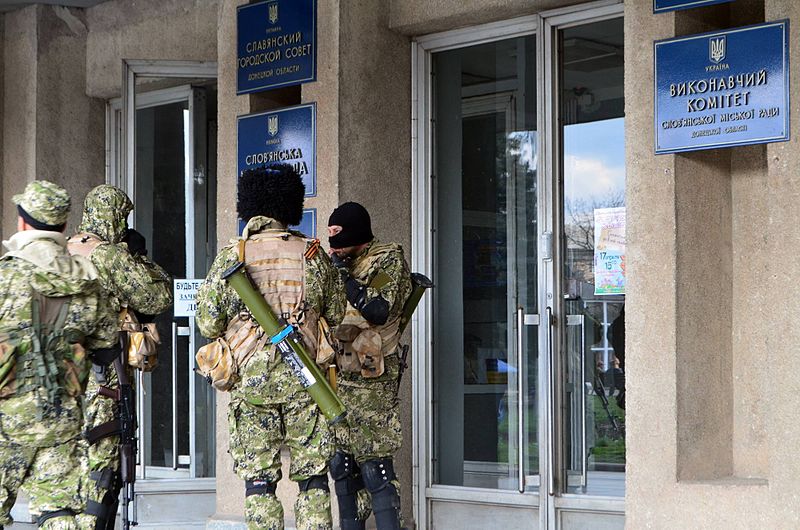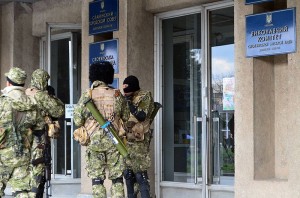Leaked recording: Russian paramilitary in Ukraine on the phone with Moscow


By Bohdan Holub
The observers of the Ukrainian crisis sighed with relief – some with despair – when the Ukrainian government did not immediately act following the deadline for pro-Russian separatists to withdraw from captured government buildings in Eastern Ukraine.
Ukraine’s interim President Oleksandr Turchynov had given an ultimatum to the separatists to leave the buildings and disarm by 2 a.m. on Monday. The Ukrainian leader also promised to sign a decree which would make sure that the individuals who laid arms would not be prosecuted.
However, Moscow-backed separatists defied the ultimatum and instead used the time to strengthen their positions and get back-up. As the world watched the situation escalate in 9 cities of eastern Ukraine, the interim president of Ukraine made a difficult decision to act. The Russian government had already warned Kiev not to use any force last week or face repercussions. Under the virtual threat of second invasion of Russian forces (first was in Crimea), Ukrainian leaders decisively yet carefully launched an anti-terrorist operation against Moscow-backed insurgents today.
The operation targets elimination of insurgency and armed groups that are occupying government buildings and police headquarters in nine cities of the Donetsk district, including its regional capital Donetsk and the city of Luhansk in the neighboring district. The armed militia is demanding secession and unification with Russia, an expected scenario Moscow has put together to partition Ukraine.
The Ukrainian security forces are acting to reclaim the following cities in Donetsk district: Donetsk – the regional capital with a population of 1 million, Mariupol which is the district’s second largest city with a population of 460 thousand, Makiyivka, Khartsyzk, Yevakiyeve, Horlivka, Druzhkivka, Kramatorsk and Slovyansk.
In the meantime, the Ukrainian intelligence services captured the communication between the Russian separatists (read Russian paramilitary groups dispatched to Eastern Ukraine) and the operatives in Moscow.
The recording with English subtitles leaked to internet (see below) shows how the leaders of the armed paramilitary groups are reporting to the superiors in Russia and asking for back up and anti-tank weapons.
The paramilitary operatives code-named “Nose,” “Adler,” “Shooter” and “Agath,” clarify the details of successful counterattack they launched against the Ukrainian forces, in which, according to the paramilitary, “important people” [on the Ukrainian side] were eliminated. One of the “important people” is apparently Hennadiy Bilichenko, captain of SBU (Security Service of Ukraine) fallen in a counterattack by the Russian paramilitary.
One paramilitary operative on the tape who appears to be in Slovyansk requests anti-tank weapons, apparently expecting a larger offensive by the Ukrainian anti-terrorism units. One caller states that he will dispatch a platoon from Luhansk as a back-up for the paramilitary in Slovyasnk, while he’s warned that the area is surrounded and they would have to fight their way in.
Although the conventional Russian army of 40 thousand has stockpiled thousands of weapons and military hardware, Moscow is unlikely to launch an offensive and cross the international border. If Russia invades, it would face an extremely harsh reaction from the international community which has already decried Moscow’s actions vis-a-vis Crimea.
The developments demonstrate that Moscow has now opted for the war of attrition in order to exhaust the enemy by the armed insurgency. Seeing virtually no difficulty in dispatching armed groups and arms distribution in Donetsk, Luhansk and Kharkiv, this strategy may pay off, as far as Moscow in concerned. It would cause thousands of casualties and wear out Ukrainian resources much like the war in Iraq and Afghanistan did with the United States.
However, as history shows, Ukrainians are no weaker of an enemy when it comes to the insurgency. They have fought two major partisan wars against the occupying Nazi Germany and the Soviet forces. The question is how far will the Ukrainians go to protect the sovereignty of the country?
Bohdan Holub is an independent political commentator




